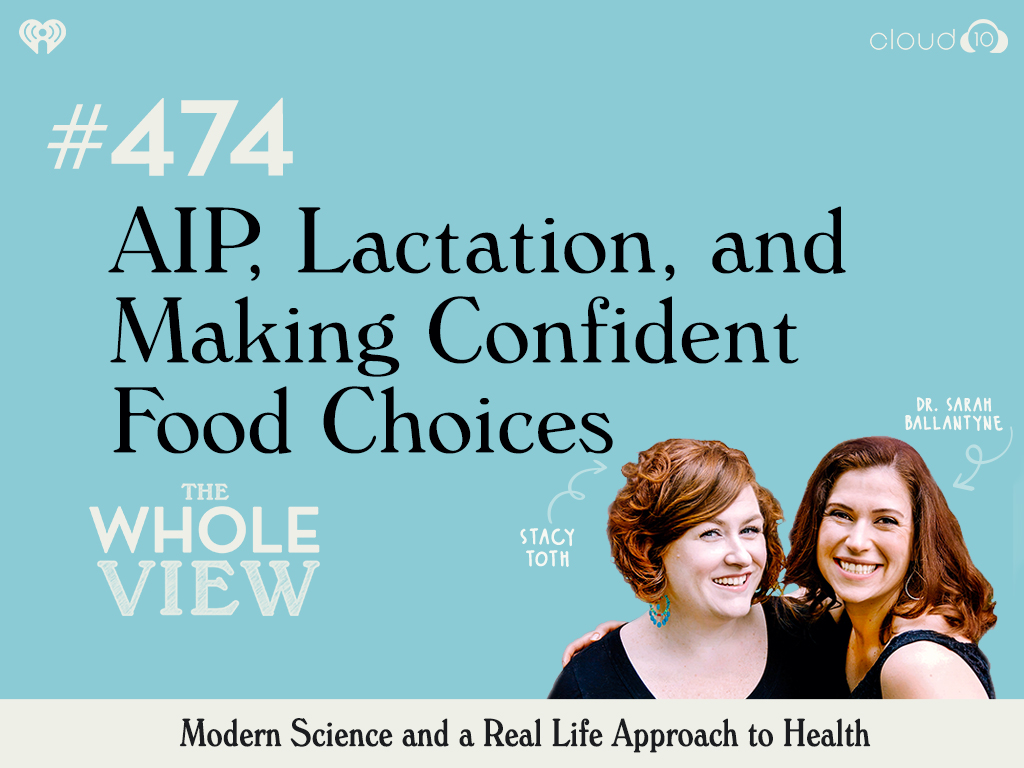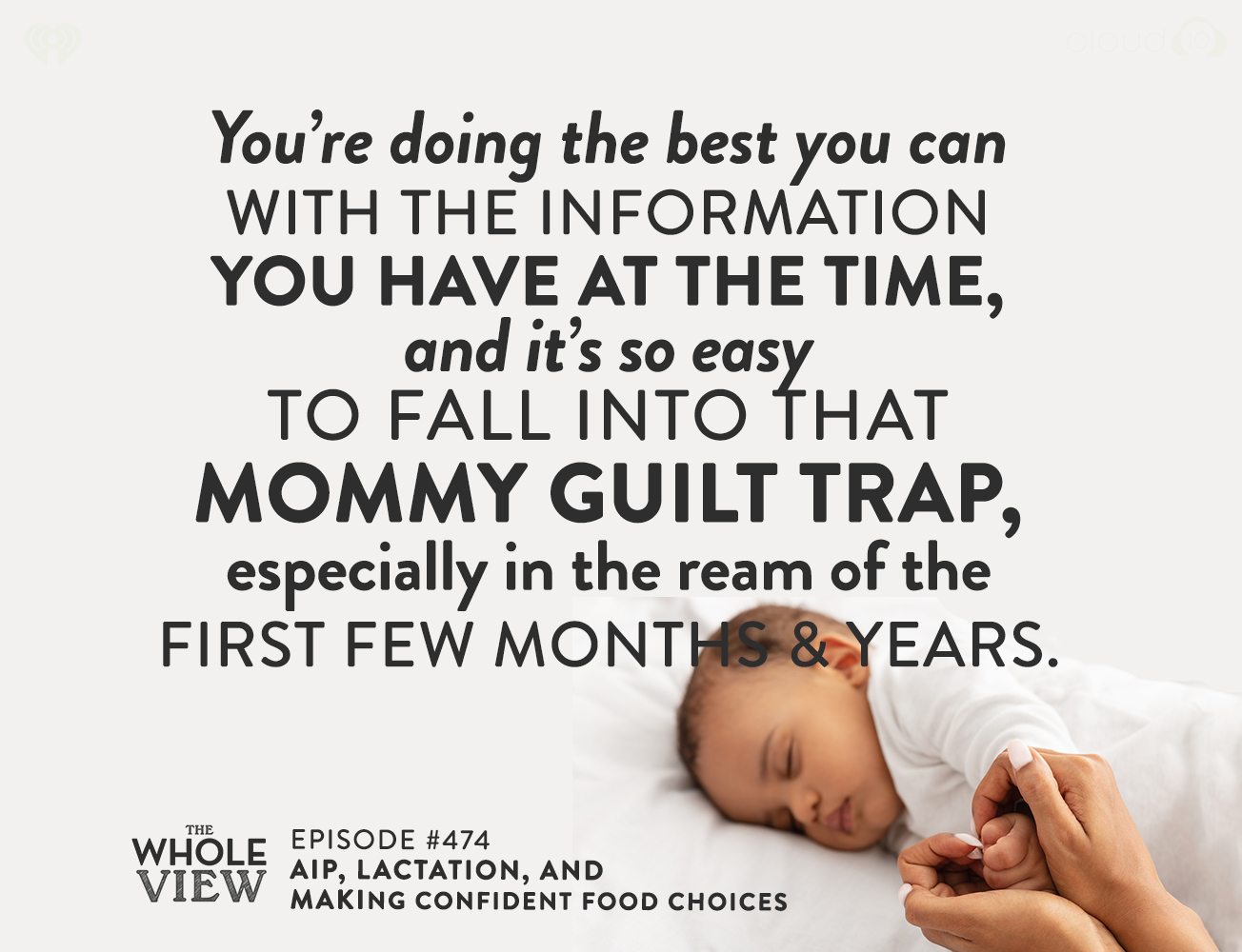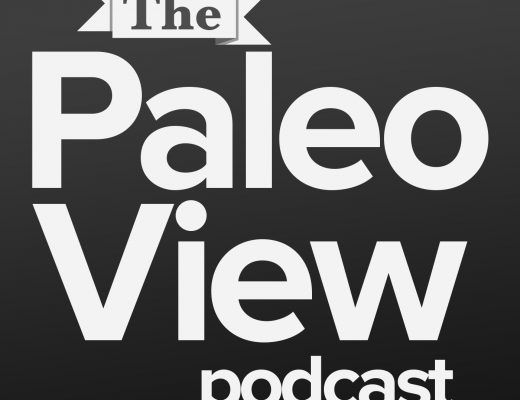
Welcome to episode 474 of The Whole View! This week, Stacy and Dr. Sarah dive into the science behind how making confident food choices. They look at how pregnancy and lactation can fit into the AIP and even recommend whole food sources for much-needed nutrients.
If you enjoy the show, please review it on iTunes!
The Whole View, Episode 474: AIP, Lactation, and Making Confident Food Choices
Welcome back to episode 474! (0:28)
Stacy and Dr. Sarah focus a lot on this show to find confidence in our food choices.
It’s also very important that we let go of the dogma around food to focus on health and nutrition.
We do the best we can with the information we have at the time, and it’s so easy to fall into that mommy guilt, especially in those first few years and into adolescence and teenage-dom.
Listener Question:
I want to know how I can safely do the autoimmune protocol if I am breastfeeding and also don’t want to lose weight. It seems every time I go even a bit lower carb at all, I lose weight I don’t have to lose. My nausea gets worse and I feel like I’m starving to death no matter how much meat, fruit and veg I eat.
I eat a lot of nuts and avocado to try to keep up the calories, but it isn’t always enough. I have a harder time falling asleep and wake up hungry in the night and can’t fall asleep without eating something. It makes it feel impossible to make changes. I don’t know what to eat and it’s really stressful.
Stacy and Dr. Sarah have talked a lot recently about weight discrimination as it relates to bigger bodies. Stacy feels it’s very important to underline that this is a safe and inclusive space for all body shapes and sizes.
Dr. Sarah adds that it’s more dangerous to be underweight with autoimmune disease.
She also reminds listeners that neither she nor Stacy is medical professionals. So it’s so important to work with a primary care doctor.
A Diagnosis Would Be Helpful
Stacy and D. Sarah stress the importance of not self-diagnosing. It sounds like what listener-Sarah might have Graves’ Disease, encouraging her to get a proper diagnosis. (8:05)
Yes, plenty of people opt to follow the AIP before they get a diagnosis (either because they’re in the early stages of their diseases and want to prevent them from developing further or because they’ve gone doctor to doctor for years without answers).
BUT, doing the AIP is not a substitute for working with your doctor and doing diagnostic tests or taking recommended medications, treatments, surgeries, supplements, etc.
Ideally, the AIP means we can reduce or eliminate the need for DMARDs. However, especially when we’re talking about endocrine organs, it’s normal to continue to need hormone replacement medication.
You wouldn’t expect a type 1 diabetic to stop using insulin, and having to take something like thyroid hormone replacement for a condition doesn’t mean she didn’t “AIP hard enough.”
Often medication can help to regulate a system in the human body so our bodies can fully respond to diet and lifestyle changes.
Other underlying health conditions that can be behind symptoms in addition to autoimmune diseases, like persistent infection or HPA axis dysfunction, are worth investigating. Usually, this is the realm of a functional or integrative medicine practitioner.
For more on this, see Episode 338: Integrative, Functional, or Naturopathic?
AIP is Not Low Carb
Sarah mentions having problems every time she drops her carb intake. (14:32)
We covered some common misconceptions about the AIP in episode 377, but it’s worth briefly talking about one that Sarah has: that the AIP is low carb.
AIP is balanced macros because this is important for getting all of our micronutrients. Ideal distribution of macronutrient intake:
- ~20 to 35% calories from fat
- ~20 to 35% calories from protein
- ~30 to 60% calories from carbohydrate
See also AIP FAQ: Carbohydrate Intake on the Autoimmune Protocol and Episode 359: Should I be tracking my macronutrients?
Can AIP be Followed During Lactation?
The short answer is yes! (20:05)
It’s also helpful to recognize a very complex interplay between sex and fertility hormones and autoimmune disease.
Some autoimmune diseases—schizophrenia (a suspected autoimmune disease), type 1 diabetes, nephritis, ankylosing spondylitis, and Still’s disease—are more likely to manifest during puberty.
Others—including Addison’s disease, celiac disease, and Crohn’s disease—will delay puberty.
Other conditions include autoimmune progesterone dermatitis, systemic lupus erythematosus, and rheumatoid arthritis cycle in terms of intensity of symptoms during the month in response to the changing levels of sex hormones in women.
Symptoms of some autoimmune diseases, such as systemic lupus erythematosus, subside during menopause.
Confident Food Choices: Fertility and Pregnancy
Fertility hormones, such as gonadotropin-releasing hormone (GnRH), have been linked to autoimmune thyroid disorders. Stopping hormone therapy does not cause immediate remission, but the disease typically persists for two or more years afterward. (24:30)
Fertility treatments are also linked to multiple sclerosis.
Oral contraceptives increase the risk of developing Crohn’s disease and systemic lupus erythematosus but decrease the risk of rheumatoid arthritis.
Pregnancy and oral contraceptives are known to cause many autoimmune diseases to go into remission, but many others to flare.
It is important to note that many women whose autoimmune diseases abate during pregnancy will suffer from a flare either upon the birth of the baby (within the first few weeks postpartum, when their hormones and immune system revert to “normal”) or upon weaning the child (when another hormone shift takes place).
Conversely, women who experience increased symptoms during pregnancy will often see a reduction in postpartum symptoms upon weaning.
For women who flare upon birth or weaning (like I did), there’s a compelling reason to stick with elimination phase AIP through that hormone transition. (And, these same women can enjoy a little more diet flexibility during pregnancy)
Risk of Flares
For women who flared during pregnancy and see symptoms decrease postpartum, you can enjoy a little more flexibility.
We’re going to talk about increased nutrient needs for lactation and which elimination phase AIP foods can help meet those needs, but also which foods would be good if you have that extra flexibility earned by a pregnancy flare that’s going away postpartum.
Also, it’s helpful to understand that with a hyperactive immune system, your body often sees the sap of nutrients from the child as an attack on the system and overreacts. This could result in a flare.
Nutrients for Lactation
It’s helpful to be aware of the additional nutrient requirements of the body to support lactation fully. (35:05)
You have increased demand for all micronutrients as well as energy, especially protein and carbohydrates. However, a few nutrients are especially likely to have dietary shortfall compared to increased need:
- Calcium
- Zinc
- Magnesium
- Vitamins B6, E, B1, B9 (folate)
Let’s look at top food sources of these nutrients! First, women who are lactating or pregnant do need more carbohydrates than more sedentary adults.
- AIP carbs:
- Root veggies – sweet potato, parsnip, cassava,
- Winter squash
- Fruit – plantain
- If you have flexibility:
- Rice
- Gluten-free oats (Episode 461: Oats-M-G, Are These Actually Healthy?)
- Lentils, chickpeas, and split peas (best legumes for gut microbiome)
In addition, pregnancy and lactation also increase a need for protein.
Where To Get These Nutrients & Be More Confident In Your Food Choices
AIP protein
- Fish
- Shellfish
- Red meat
- Poultry
- Organ meat
- Broth
- Calcium
AIP
- Chives
- Radishes
- Seaweed
- Beef
- Dark Leafy Greens
- Sardines
- Canned salmon with bones
- Molasses
- Mineral water
Flexibility
- Grass-fed dairy
- Tofu
- Sesame seeds
- Chia seeds
Zinc
AIP
- Oysters (265mg)
- Liver
- Crab
- Wild Game (red meat)
- Lobster
- Red meat (farmed)
- Clams
- Other organ meat
- Mushrooms
- Seaweed
Magnesium
AIP
- Seaweed
- Dark Leafy Greens
- Chives
- Fish
- Avocados
Flexibility
- Pumpkin seeds
- Soy
- Brazil nuts
- Sunflower seeds
- Other nuts and seeds
Vitamin B6
AIP
- Onion Family
- Liver
- Fish
- Meat (poultry and red meat)
- Garlic
- Dark Leafy Greens
Flexibility
- Peppers
- Sunflower seeds
- Pistachios
Vitamin E
AIP
- Leafy greens
- Avocado
- Olives
- Organ meat
- Shellfish
- Unrefined plant oils (e.g., coconut oil, olive oil, avocado oil)
- Fatty fish
- Winter Squash
Flexibility
- Nuts
- Seeds
Vitamin B1
AIP
- Pork
- Fish
- Liver
- Mussels
- Acorn squash
- Asparagus
Flexibility
- Legumes
- Nuts
- Seeds
- Peppers
Vitamin B9 (folate)
AIP
- Organ meat
- Green vegetables
- Leafy greens
- Beets
- Asparagus
- Avocados
- Papayas
- Strawberries
- Seaweed
Flexibility
- Legumes
Also, check out our Nutrivore episode:
- TWV Podcast Episode 437: Intro To Nutrivore
- TWV Podcast Episode 442: How Do I Know what Dietary Protocol to Start with?
Final Thoughts
Stacy and Dr. Sarah hope all this information will help you be more confident in your food choices.
If you enjoyed this show, we invite you to join Stacy and Dr. Sarah over on Patreon for exclusive behind-the-scenes content about how Stacy and Sarah feel about the topics they discuss. Your subscription goes to support this show and gets you direct access to Stacy and Sarah.
We invite you to subscribe to this channel and the realeverything.com and thepaleomom.com blogs and newsletters.
Thanks so much for listened and we will see you next week!
Want more info on our Real Life? Healthy recipes, parenting tips, and general lifestyle stuff goes out in our Real Everything newsletter, join here.
Never want to miss a post, sale, or deal? Join my Healthy Inside & Out e-mail list for more info on non-toxic living and safer skincare!





